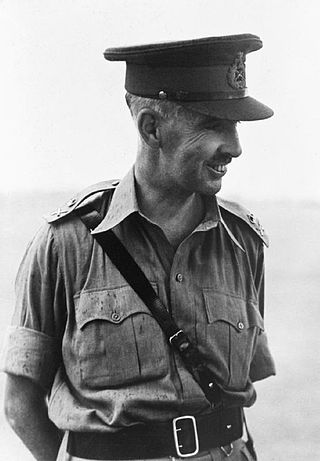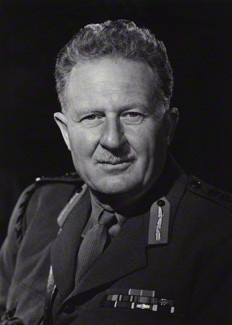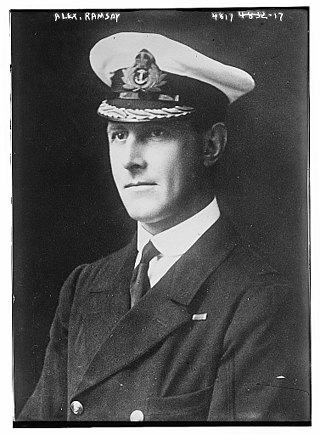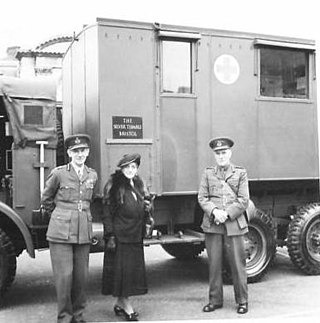Related Research Articles

General Sir Richard Nugent O'Connor, was a senior British Army officer who fought in both the First and Second World Wars, and commanded the Western Desert Force in the early years of the Second World War. He was the field commander for Operation Compass, in which his forces destroyed a much larger Italian army – a victory which nearly drove the Axis from Africa, and in turn, led Adolf Hitler to send the Afrika Korps under Erwin Rommel to try to reverse the situation. O'Connor was captured by a German reconnaissance patrol during the night of 7 April 1941 and spent over two years in an Italian prisoner of war camp. He eventually escaped after the fall of Mussolini in the autumn of 1943. In 1944 he commanded VIII Corps in the Battle of Normandy and later during Operation Market Garden. In 1945 he was General Officer in Command of the Eastern Command in India and then, in the closing days of British rule in the subcontinent, he headed Northern Command. His final job in the army was Adjutant-General to the Forces in London, in charge of the British Army's administration, personnel and organisation.

Sir John Desmond Patrick Keegan was an English military historian, lecturer, author and journalist. He wrote many published works on the nature of combat between prehistory and the 21st century, covering land, air, maritime, intelligence warfare and the psychology of battle.

Colonel Arthur Espie Porritt, Baron Porritt, was a New Zealand physician, military surgeon, statesman and athlete. He won a bronze medal at the 1924 Summer Olympics in the 100 m sprint. He served as the 11th governor-general of New Zealand from 1967 to 1972.

Lieutenant-General Arthur Ernest Percival, was a British Army officer. He saw service in the First World War and built a successful military career during the interwar period, but is best known for his defeat in the Second World War, when Percival commanded British Commonwealth forces during the Malayan campaign, which culminated in a catastrophic defeat at the Battle of Singapore.

Marshal of the Royal Air Force Arthur William Tedder, 1st Baron Tedder, was a Scottish Royal Air Force officer and peer. He was a pilot and squadron commander in the Royal Flying Corps in the First World War and he went on to serve as a senior officer in the Royal Air Force (RAF) during the inter-war years when he served in Turkey, Great Britain and the Far East.

Lieutenant-General Sir Alfred Henry Keogh, was a medical doctor in the British Army. He served as Director-General Army Medical Services twice; from 1905 to 1910 and 1914 to 1918.

Field Marshal Sir Francis Wogan Festing, was a senior British Army officer. His most important posts were as Commander of British Forces in Hong Kong, General Officer Commanding (GOC) British Troops in Egypt (1952), GOC Eastern Command (1954), Commander-in-Chief Far East Land Forces (1956), and Chief of the Imperial General Staff (1958–61). He saw active service in the Second World War, taking a prominent role in Operation Ironclad and the Arakan offensive of the Burma campaign, and later advised the British government on ending conscription and reducing the size of the army by fifteen battalions.

Edward Ettingdere Bridges, 1st Baron Bridges, was a British civil servant.

Bertrand Edward Dawson, 1st Viscount Dawson of Penn, was a physician to the British Royal Family and President of the Royal College of Physicians from 1931 to 1937. He is known for his responsibility in the death of George V, who under his care was surreptitiously injected with a fatal dose of cocaine and morphine to hasten his death, without obtaining any prior patient consent and in contravention of the law at the time, possibly constituting or amounting to murder and high treason.

Admiral Sir Alexander Robert Maule Ramsay was a Royal Navy officer. He was the husband of Princess Patricia of Connaught, the youngest child of Prince Arthur, Duke of Connaught and Strathearn, third son of Queen Victoria. He served with distinction during the First World War. During the 1920s and 1930s, he held several important naval aviation commands.

General John Nicholas Reynolds Houghton, Baron Houghton of Richmond, is a retired senior British Army officer and former Chief of the Defence Staff (CDS) of the British Armed Forces. He was appointed CDS in July 2013, following the retirement of General Sir David Richards. He served as Commanding Officer of the 1st Battalion, the Green Howards in Northern Ireland during The Troubles and later became Commander of the 39th Infantry Brigade in Northern Ireland. He deployed as Senior British Military Representative and Deputy Commanding General, Multi-National Force – Iraq during the Iraq War. Later, he became Chief of Joint Operations at Permanent Joint Headquarters and served as Vice-Chief of the Defence Staff until assuming the position of CDS. Houghton retired from the British Army in July 2016, and was succeeded as CDS by Air Chief Marshal Sir Stuart Peach.

Narendra Babubhai Patel, Baron Patel, is a Tanzanian-British obstetrician and cross bench peer, and a former Chancellor of the University of Dundee.

General Francis Richard Dannatt, Baron Dannatt, is a retired senior British Army officer and member of the House of Lords. He was Chief of the General Staff from 2006 to 2009.

Major General Sir Samuel Roy Burston, was an Australian soldier, physician, and horse racing identity.

Sir John Rose Bradford, 1st Baronet was a British physician.

Charles Frederick William Illingworth was a British surgeon who specialised in gastroenterology. Along with a range of teaching and research interests, he wrote several surgical textbooks, and played a leading role in university and medical administration.
Lieutenant-General Sir James Parlane Baird, was a British Army officer and doctor. He served as Director General Army Medical Services from 1973 to 1977.

Lieutenant-General Sir William Porter MacArthur was an Irish-born British Army officer and medical doctor. He served as Commandant of the Royal Army Medical College from 1935 to 1938, and Director General Army Medical Services from 1938 to 1941. His specialism as a medical doctor was tropical medicine and he served as president of the Royal Society of Tropical Medicine and Hygiene from 1959 to 1961.
Brigadier Sir Lionel Ernest Howard Whitby, CVO, MC was a British haematologist, British Army officer and academic. He served as Regius Professor of Physic at the University of Cambridge from 1945 to 1956, Master of Downing College, Cambridge from 1947 to 1956, and Vice-Chancellor of the University of Cambridge from 1951 to 1953.
Lieutenant-General Sir William Robert MacFarlane Drew, KCB, CBE, FRCP, FRCPE, FRACP was an Australian-born British army doctor.
References
- 1 2 3 "Keegan, Sir Donal (Arthur John)", Who's Who (online ed., Oxford University Press, December 2018).
- ↑ Supplement to the London Gazette , 31 December 1998 (issue 55354), p. 11.
- ↑ Supplement to the London Gazette , 16 June 2012 (issue 60173), p. 3